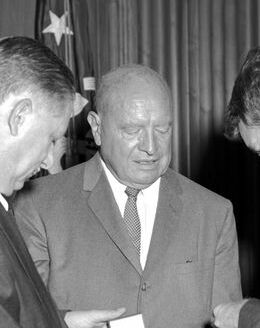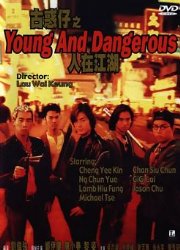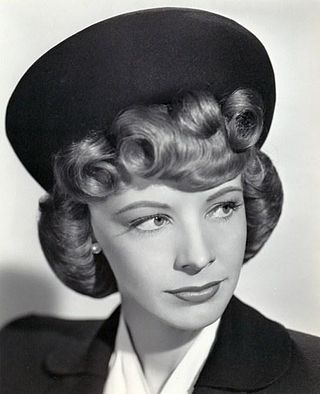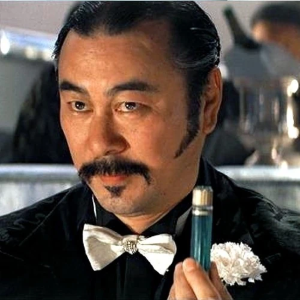
Opium is dried latex obtained from the seed capsules of the opium poppy Papaver somniferum. Approximately 12 percent of opium is made up of the analgesic alkaloid morphine, which is processed chemically to produce heroin and other synthetic opioids for medicinal use and for the illegal drug trade. The latex also contains the closely related opiates codeine and thebaine, and non-analgesic alkaloids such as papaverine and noscapine. The traditional, labor-intensive method of obtaining the latex is to scratch ("score") the immature seed pods (fruits) by hand; the latex leaks out and dries to a sticky yellowish residue that is later scraped off and dehydrated. The word meconium historically referred to related, weaker preparations made from other parts of the opium poppy or different species of poppies.

Harry Jacob Anslinger was an American government official who served as the first commissioner of the U.S. Treasury Department's Federal Bureau of Narcotics during the presidencies of Herbert Hoover, Franklin D. Roosevelt, Harry S. Truman, Dwight D. Eisenhower, and John F. Kennedy. He was a supporter of Prohibition, and of the criminalization of all drugs, and spearheaded anti-drug policy campaigns.

The Leased Territory of Guangzhouwan, officially the Territoire de Kouang-Tchéou-Wan, was a territory on the coast of Zhanjiang in China leased to France and administered by French Indochina. The capital of the territory was Fort-Bayard, present-day Zhanjiang.

The Young and Dangerous film series is a collection of Hong Kong films about a group of triad young members, detailing their adventures, dangers and growth in a Hong Kong triad society. The series is based on a popular comic book series known as "Teddy Boy".

Signe Eleonora Cecilia Hasso was a Swedish actress, writer, and composer.

The Single Convention on Narcotic Drugs, 1961 is an international treaty that controls activities of specific narcotic drugs and lays down a system of regulations for their medical and scientific uses; it also establishes the International Narcotics Control Board.

Philip Ahn was an American actor and activist of Korean descent. With over 180 film and television credits between 1935 and 1978, he was one of the most recognizable and prolific Asian-American character actors of his time. He is widely regarded as the first Korean American film actor in Hollywood. He is not to be confused with Philson Ahn, another screen actor who broke into films in the late 1930s; Philson was Philip's younger brother.

The Federal Bureau of Narcotics (FBN) was an agency of the United States Department of the Treasury, established in the Department of the Treasury by an act of June 14, 1930, consolidating the functions of the Federal Narcotics Control Board and the Narcotic Division. These older bureaus were established to assume enforcement responsibilities assigned to the Harrison Narcotics Tax Act of 1914 and the Jones–Miller Narcotic Drugs Import and Export Act of 1922.

The Customs and Excise Department (C&ED) is a government agency responsible for the protection of the Hong Kong Special Administrative Region against smuggling; the protection and collection of revenue on dutiable goods on behalf of the Hong Kong Government; the detection and deterrence of drug trafficking and abuse of controlled drugs; the protection of intellectual property rights; the protection of consumer interests; and the protection and facilitation of legitimate trade and upholding Hong Kong's trading integrity.

New Police Story is a 2004 Hong Kong action thriller film produced and directed by Benny Chan, starring Jackie Chan, Nicholas Tse, Charlie Yeung, Charlene Choi, Daniel Wu and Wang Chieh. The film was released in the Hong Kong on 24 September 2004.

Richard Loo was an American film actor who was one of the most familiar Asian character actors in American films of the 1930s and 1940s. He appeared in more than 120 films between 1931 and 1982.

In the United States, increased restrictions and labeling of cannabis as a poison began in many states from 1906 onward, and outright prohibitions began in the 1920s. By the mid-1930s cannabis was regulated as a drug in every state, including 35 states that adopted the Uniform State Narcotic Drug Act. The first national regulation was the Marihuana Tax Act of 1937.

Roy Paul Harvey was an American character actor who appeared in at least 177 films.

Fatal Move is a 2008 Hong Kong action film written, produced and directed by Dennis Law. The film stars Sammo Hung, Simon Yam and Wu Jing, who reunite after 2005's SPL: Sha Po Lang.

Edgar Hughes "Blue" Washington was an American actor and baseball player who played in the Negro leagues from 1915 to 1920 as a pitcher and first baseman.

Roy Chiao was a Hong Kong actor, most notable in the United States for playing the minor villain Lao Che in the 1984 movie Indiana Jones and the Temple of Doom.

The history of opium in China began with the use of opium for medicinal purposes during the 7th century. In the 17th century the practice of mixing opium with tobacco for smoking spread from Southeast Asia, creating a far greater demand.

Enter the Fat Dragon is a 2020 Hong Kong martial arts comedy film directed by Kenji Tanigaki and Aman Chang from a screenplay by and co-starring Wong Jing, who also acted producer with Connie Wong and lead actor Donnie Yen. The film co-stars Teresa Mo and Niki Chow. The film was announced as a remake of Sammo Hung's 1978 film of the same name, but isn't.
Fung Hak-on was a Hong Kong actor. He appears in Hong Kong films since the 1960s until mid 2010s.
Drug Addict is a 1948 documentary made by Robert Anderson for the National Film Board of Canada. It is the only Canadian film that remains banned in the United States.


















